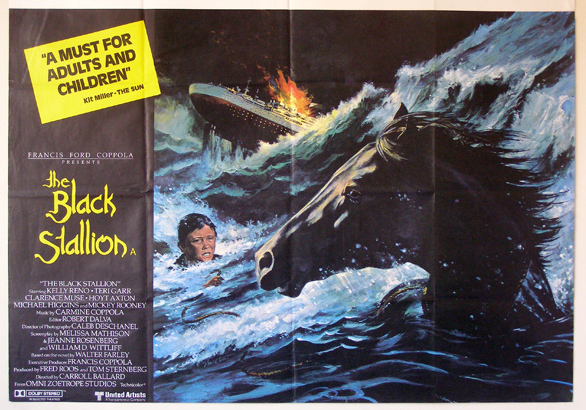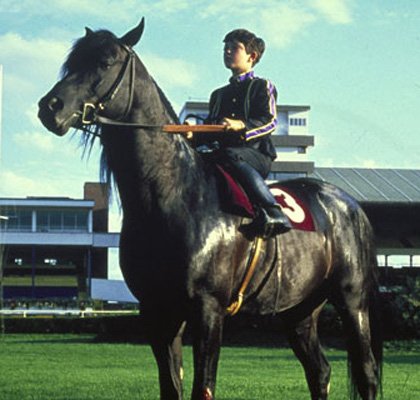1979: Revisiting The Black Stallion
 Saturday, May 16, 2015 at 1:00PM
Saturday, May 16, 2015 at 1:00PM In honor of the Year of the Month (1979) and horse racing’s most exciting month – with the second leg of the Triple Crown, the Preakness, being run today – Lynn Lee revisits a childhood favorite movie, The Black Stallion.

As a little girl, I didn’t ride horses but I loved reading about them, from Black Beauty to Misty of Chincoteague to just about every book in the Black Stallion series. Naturally I loved the Black Stallion movie and watched it multiple times in my pre-teen years. I recently decided to watch it again and see how I felt about it over two decades later. Here are the five things that struck me most strongly this time around:
 1. How quiet the film is.
1. How quiet the film is.
There’s barely any dialogue. That makes sense for the first half, most of which takes place on a desert island where the two shipwrecked protagonists, the boy Alec and the Black Stallion, slowly earn each other’s trust. But even after they’re rescued and return to society and enter a big honking horse race, the quiet remains. Most of the human characters have only a handful of lines... [More]
Even the crucial friendship that develops between Alec and trainer Henry Dailey is conveyed as much through looks and gestures as through their terse verbal exchanges. Carmine Coppola’s score does a lot of the lifting as well, but even the music tends to be remarkably spare. While I generally prefer my movies a little talkier, there’s something impressive about The Black Stallion’s economy of words. It may be a hallmark of director Carroll Ballard, who cut his directing teeth on nature films and documentaries, and is also known for other man-and-nature movies like Never Cry Wolf and Fly Away Home. (Fun fact: Executive producer Francis Ford Coppola, who originally wanted to direct TBS, turned it over to Ballard because he was too busy with Apocalypse Now, which was also released in 1979.)
2. The stunning cinematography.
A Criterion Collection edition of The Black Stallion is slated for release in July (not in time for this post, alas), and no wonder. The movie, like its subject, is a looker – especially in the first half, from the terror and chaos of the fiery sinking ship (staged in a tank and using models, but you wouldn’t know it) to the lonely beauty of the island where Alec and the Black wash up. Though shot in Sardinia, the island scenes really convey the feeling of a distant, uninhabited place, at once inviting and forbidding, with its crystalline lagoons, striking rock formations, and womb-like caves. The action shots of the horse(s) playing the Black are brilliant, and convincingly sell the sentimental core of the story: a wild stallion partly tamed by the love of a boy he helps save and who helps save him. DP Caleb Deschanel went on to collect five Oscar nominations, though no wins, for cinematography. (Fun fact: he’s also the father of Zooey and Emily.)

3. How much DNA the screenplay shares with “E.T.”
Maybe I just have E.T. on the brain after writing about it recently, or maybe it’s because one of TBS’s screenwriters was Melissa Mathison, who went on to write the screenplay for E.T. a few years later, but I was really struck by the thematic similarities. Lonely boy is fascinated by a non-human creature from another world, overcomes its wariness with the lure of food, and develops a deep, almost symbiotic emotional connection with it that no one else can really understand. Both movies also benefit from completely believable performances by their child actors: Henry Thomas’ Elliott and Kelly Reno’s Alec are cute, but they don’t preen or pander to the camera. They feel like real boys, resourceful and mature beyond their years not because they’re annoyingly precocious but because they’re so focused on caring for their precious new companion.
4. The Bucephalus motif still works.
A recurring thread in the movie is Bucephalus, the wild horse tamed by Alexander the Great. Alec’s father tells him the story of Bucephalus the night before the ship sinks, giving him a tiny, perfect model of the famous horse that Alec keeps as his totem and his inspiration at key moments. The movie begins and ends with that totem but it’s otherwise sparingly used and, perhaps for that reason, surprisingly effective.
 5. Mickey Rooney IS Henry Dailey.
5. Mickey Rooney IS Henry Dailey.
This was the first movie I ever saw Mickey Rooney in, when I had no knowledge of his history as a child actor, vaudeville performer, or yellowface caricature in Breakfast at Tiffany’s. Perhaps that’s why even now I can’t see him as anything but the gruff yet kindly retired trainer who takes Alec and the Black in hand. A quiet, lived-in performance that plays well off Kelly Reno’s reticence, it was nominated for best supporting actor Oscar, losing to Mervyn Douglas in Being There. (Also in the mix that year: Robert Duvall for Apocalypse Now, youngest-nominee-ever Justin Henry for Kramer v. Kramer, and Frederic Forrest for The Rose.) Did Rooney deserve it? Maybe not; the general consensus seems to be that the nomination was a nod to his past glories, and I haven’t seen Being There. But there’s no doubt that Rooney’s work in TBS has endured and will continue to endure for future generations who, like me, will always see him as Henry.

Have you ever seen The Black Stallion?



Reader Comments (4)
Mickey Rooney deserved only one of his four Oscar nominations (The Human Comedy), but his Henry Daily instantly becomes a totally deserving nominee when compared to Melvyn Douglas in Being There. (What's going on in the Supporting Actor category with its hideous old age/sentimental wins for people like George Burns, Dom Ameche and Douglas for the second time?) One way or the other, instead of Rooney and Douglas, Oscar probably better should have taken Paul Dooley in Breaking Away and Fat Man in Apocalypse Now.
Anyway, I so much loved The Black Stallion that I even watched The Black Stallion Returns which was much weaker, but did correct the one mistake the first film made: Carmine Coppola's remarkably spare score never worked for me and I wish there'd be even less of it in the final film.
"Henry Daily"
Daily? No, Dailey.
Mickey Rooney was certainly more memorable here than Douglas was in Being There. That said, the real star of the movie is the cinematography.
I loved this movie. The Black Stallion should have been one of the 5 Best Picture nominees of its year, and Carroll Ballard should have been one of the Best Director nominees.
I loved the books too. The movie meets the book and then goes into the realm of imagination where the reader lived when reading the book. The gorgeous exteriors are an interior landscape.
Speaking of the Preakness, this was an exciting year. The drama of the downpour of rain, throwing a wrench in the works so that two long shots come in second and third, and yet the favorite still has a resounding victory, looking like a legend. I can hardly wait for the Belmont.